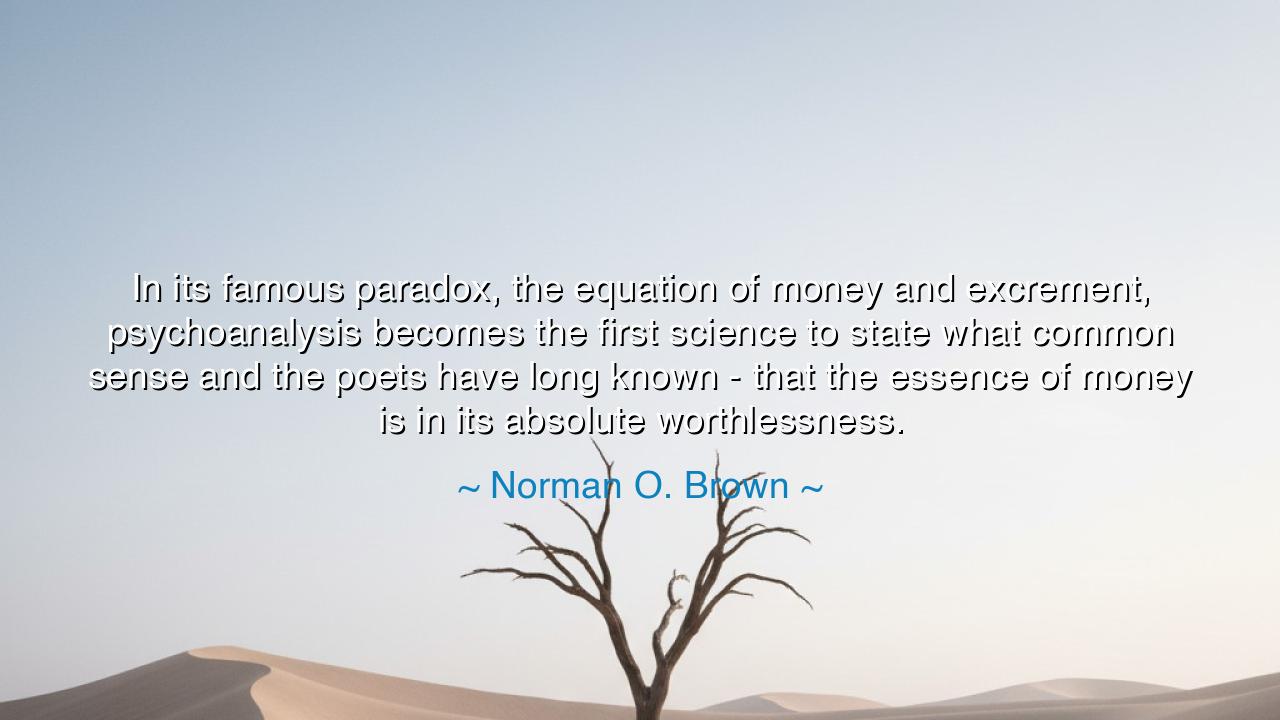
In its famous paradox, the equation of money and excrement
In its famous paradox, the equation of money and excrement, psychoanalysis becomes the first science to state what common sense and the poets have long known - that the essence of money is in its absolute worthlessness.






Host: The room feels dim, the soft shadows of evening stretching across the floor as the light begins to fade. The air is still, filled with the distant hum of the world outside. Jeeny sits at the table, her fingers resting lightly on a book, her mind lost in thought. Jack stands near the window, arms crossed, looking out at the city below. The silence between them feels like the calm before a conversation that’s waiting to unfold.
Jeeny: (her voice soft, yet filled with a quiet curiosity) “You ever think about how we treat money in our society? The way it’s both incredibly important and, at the same time, almost completely meaningless when you really stop and think about it?”
Jack: (glancing at her, his voice dry, but intrigued) “Meaningless? That’s a bold statement. Money’s the whole system, isn’t it? It’s what drives everything—the economy, society, decisions. How can it be meaningless?”
Jeeny: (nodding slowly, her eyes thoughtful as she explains) “I was reading something by Norman O. Brown, and he said, ‘In its famous paradox, the equation of money and excrement, psychoanalysis becomes the first science to state what common sense and the poets have long known—that the essence of money is in its absolute worthlessness.’ It made me think about how we assign so much value to money, but in the grand scheme of things, it’s really just an illusion. It’s only worth what we believe it’s worth.”
Jack: (pauses, his brow furrowing as he processes her words) “Wait, so you’re saying money has no intrinsic value? It’s just something we’ve agreed upon, a concept that has power only because we give it power?”
Jeeny: (smiling slightly, her voice gaining a bit more momentum) “Exactly. It’s like the equation of money and excrement. On its own, money has no meaning. It’s just paper, numbers, objects. But because we’ve built a system around it, we’ve attached so much significance to it. Money represents power, success, security—but only because we’ve decided it does. Take away that belief, and what is it really?”
Host: Jeeny’s words seem to settle in the air, the weight of the idea sinking between them. Jack stands still, his gaze shifting toward the window, as if reflecting on the nature of money and the system they all live within. The world outside continues, but inside, the conversation has opened up something deeper.
Jack: (his voice softer now, more introspective) “So, we’ve built this entire system around something that doesn’t actually have any real worth outside of what we assign to it. And yet, we let it define so much of our lives—what we can do, what we can have, even who we are.”
Jeeny: (nodding, her voice calm and filled with quiet clarity) “Yes. It’s a paradox, isn’t it? We depend on money to give us the things we think we need, but in reality, it’s only as valuable as the belief we place in it. Money is a tool, a means to an end, but it has no inherent value in and of itself. And yet, we let it control so much of what we do.”
Jack: (pauses, looking out at the world, his voice quieter now, more reflective) “It’s crazy, isn’t it? How we base so much of our existence on something that, in the end, isn’t real. It’s just a social construct, something we’ve agreed upon as a measure of value, but it’s not actually valuable in and of itself.”
Jeeny: (smiling gently, her voice full of quiet understanding) “Exactly. And that’s why it’s so important to remember what truly matters—what gives our lives meaning beyond money. Relationships, experiences, and our own personal growth—those are the things that have real, lasting value. Money can come and go, but what you truly have is what you create for yourself, in the world and with others.”
Host: The room feels quieter now, as if the conversation has unraveled something deeply meaningful. Jack turns away from the window, his expression softer, his mind clearly shifting toward a new understanding of money and its place in life. Jeeny watches him, the satisfaction of having shared a thought that feels both profound and freeing.
Jack: (his voice a little softer now, almost with a trace of realization) “Maybe it’s time to stop letting money define so much of what we do. To remember that it’s just a tool, not the end goal. We’re chasing something deeper than that.”
Jeeny: (nodding, her smile warm with encouragement) “Exactly. Money might be a part of life, but it’s not everything. The real value lies in what we create, what we contribute, and how we live. That’s where the true richness of life lies.”
Host: The night deepens, and the world outside continues its steady rhythm, but inside, there’s a quiet understanding. Jeeny and Jack share a moment of realization—that money, as powerful as it may seem, is just a construct, and true worth comes from the things we build within ourselves and with others. The most valuable things in life are not bought; they are created.






AAdministratorAdministrator
Welcome, honored guests. Please leave a comment, we will respond soon